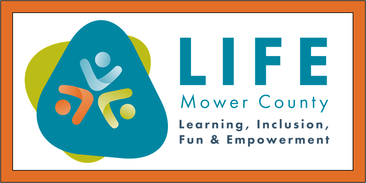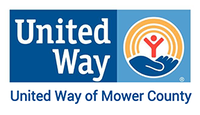People First Language
|
|
What is an Intellectual Disability?
An intellectual disability is a disability characterized by significant limitations both in intellectual functioning and in adaptive behavior as expressed in conceptual, social, and practical adaptive skills.
What is a Developmental Disability?
A developmental disability is chronic and attributable to a mental or physical impairment or both. The criteria for determining developmental disability are: manifestation before age of 22, unless resulting from head injury that occurs at any age likely to continue indefinitely, substantial limitation in three or more of the following areas - life activity, self care, receptive and expressive language, learning, mobility, self-direction, capacity for independent living, and/or economic self-sufficiency, need for a combination and sequence of special interdisciplinary care, treatment, or other services which are lifelong or of extended duration.
IT'S THE PERSON FIRST - THEN THE DISABILITY
What do you see first?
The wheelchair? The physical problems? The person?
If you are a person in a wheelchair unable to get up the stairs into a building, would you say, - "there is a handicapped person unable to find a ramp?" Or would you say, "there is a person with a disability who is unable to access a building?" What is the proper way to speak or to introduce someone who has a, disability? Consider how you would introduce someone - Jane Doe - who doesn't have a disability. You would give her name, where she lives, what she does or what she is interested in, she likes swimming, or eating Mexican food, or watching movies.
Why say it differently for a person with a disability? Every person is made up of many characteristics - mental as well as physical. Few people want to be identified only by their ability to play tennis or by their love for fried onions. In speaking or writing, remember that children or adults with disabilities are like everyone else except they happen to have a disability. Therefore, here are a few tips for improving your language related to people with disabilities.
An intellectual disability is a disability characterized by significant limitations both in intellectual functioning and in adaptive behavior as expressed in conceptual, social, and practical adaptive skills.
What is a Developmental Disability?
A developmental disability is chronic and attributable to a mental or physical impairment or both. The criteria for determining developmental disability are: manifestation before age of 22, unless resulting from head injury that occurs at any age likely to continue indefinitely, substantial limitation in three or more of the following areas - life activity, self care, receptive and expressive language, learning, mobility, self-direction, capacity for independent living, and/or economic self-sufficiency, need for a combination and sequence of special interdisciplinary care, treatment, or other services which are lifelong or of extended duration.
IT'S THE PERSON FIRST - THEN THE DISABILITY
What do you see first?
The wheelchair? The physical problems? The person?
If you are a person in a wheelchair unable to get up the stairs into a building, would you say, - "there is a handicapped person unable to find a ramp?" Or would you say, "there is a person with a disability who is unable to access a building?" What is the proper way to speak or to introduce someone who has a, disability? Consider how you would introduce someone - Jane Doe - who doesn't have a disability. You would give her name, where she lives, what she does or what she is interested in, she likes swimming, or eating Mexican food, or watching movies.
Why say it differently for a person with a disability? Every person is made up of many characteristics - mental as well as physical. Few people want to be identified only by their ability to play tennis or by their love for fried onions. In speaking or writing, remember that children or adults with disabilities are like everyone else except they happen to have a disability. Therefore, here are a few tips for improving your language related to people with disabilities.
- Speak of the person first, then the disability.
- Emphasize abilities, not limitations.
- Do not label people as part of a disability group. Don't say "the disabled." Instead say "people with disabilities."
- Don't give excessive praise or attention to people with disabilities: don't patronize them.
- Choice & independence are important. Let the person do or speak for him or herself as much as possible.
- A disability is a functional limitation that interferes with a person's ability to walk, hear, talk, learn etc.
|
Say
Child with a disability Person with cerebral palsy Person who is deaf Person with intellectual disability Person with epilepsy Person who has Without speech Developmental delay Mental illness Uses a wheelchair With Down syndrome Has a learning disability Without a disability Has a physical disability Congenital disability Condition Seizures Cleft lip Difficulty walking Medically involved Paralyzed Has hemiplegia Has quadriplegia Has paraplegia Of short stature Accessible parking |
Instead of
Disabled child CP or spastic deaf and dumb retarded or retard epileptic afflicted mute or dumb slow crazy, insane confined to a chair Mongoloid or retard is learning disabled normal or healthy crippled birth defect disease fits or spells harelip lame sickly invalid hemiplegics quadriplegic paraplegic dwarf or midget handicapped parking |
The Individuals with Disabilities Education Act
The Individuals with Disabilities Education Act (IDEA) is a law ensuring services to children with disabilities throughout the nation. IDEA governs how states and public agencies provide early intervention, special education and related services to more than 6.5 million eligible infants, toddlers, children and youth with disabilities. Infants and toddlers with disabilities (birth-2) and their families receive early intervention services under IDEA Part C. Children and youth (ages 3-21) receive special education and related services under IDEA Part B.
For more information, go to: IDEA - Building The Legacy of IDEA 2004.
For more information, go to: IDEA - Building The Legacy of IDEA 2004.

